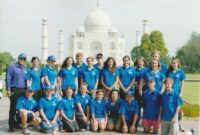Educational vacations for adults offer a unique blend of leisure and learning, transforming travel into a powerful catalyst for personal and professional growth. These enriching experiences move beyond typical tourism, focusing instead on immersive learning opportunities tailored to diverse interests and learning styles. Whether it’s exploring ancient ruins on a historical expedition, mastering a new cuisine on a culinary tour, or contributing to a community through volunteer work abroad, educational vacations cater to a wide spectrum of adult learners.
This guide delves into the multifaceted world of adult educational travel, exploring various program types, outlining planning strategies, and highlighting the numerous benefits—and potential drawbacks—involved. We’ll examine the unique advantages these trips offer for personal enrichment and professional development, while also providing practical advice for selecting reputable providers and maximizing the learning experience.
Defining Educational Vacations for Adults
Educational vacations for adults, also known as learning vacations or educational travel, represent a unique blend of leisure and learning. They offer structured opportunities for personal and professional growth within the context of travel, providing enriching experiences that go beyond the typical tourist itinerary. These vacations cater to a wide range of interests and learning styles, encompassing everything from immersive cultural experiences to intensive skill-building workshops.
Educational vacations differ significantly from traditional tourism in their primary focus. While traditional tourism prioritizes relaxation, sightseeing, and entertainment, educational vacations emphasize structured learning and personal development. The itinerary is designed around specific learning objectives, incorporating activities such as lectures, workshops, guided tours with expert commentary, and hands-on experiences. The emphasis is on active participation and engagement with the subject matter, rather than passive observation. For example, a traditional trip to Italy might involve visiting popular tourist sites, while an educational vacation might include cooking classes in Tuscany, wine tasting in Chianti, and visits to historical sites with expert-led discussions on Renaissance art.
Motivations for Participating in Educational Vacations
Adults participate in educational vacations for a variety of compelling reasons. Many seek personal enrichment and intellectual stimulation, desiring to expand their knowledge and understanding of specific subjects or cultures. Others are motivated by professional development, hoping to acquire new skills or enhance existing expertise. The opportunity for self-discovery and personal growth is also a significant draw, as these vacations provide a unique environment for reflection and introspection. Furthermore, the combination of learning and travel offers a stimulating and engaging way to escape routine and explore new perspectives. The social aspect is also appealing, offering chances to connect with like-minded individuals who share similar interests and passions. For example, an adult might choose a photography workshop in Iceland to improve their skills and explore stunning landscapes, while another might opt for a culinary tour in Southeast Asia to learn about different cuisines and cultures. The shared experiences foster a sense of community and lasting connections.
Types of Educational Vacations
Educational vacations offer a unique blend of leisure and learning, catering to a wide range of interests and learning styles. These enriching experiences allow adults to explore new cultures, acquire new skills, and deepen their understanding of the world around them, all while enjoying a well-deserved break from routine. The diverse range of options available ensures there’s a perfect educational vacation for everyone.
Categorization of Educational Vacation Types
Educational vacations can be broadly categorized based on their primary focus. This allows individuals to select a program that aligns with their specific interests and goals. The following table outlines some of the most popular types, along with their target audiences and examples.
| Type | Description | Target Audience | Example Location |
|---|---|---|---|
| Culinary Tours | These trips immerse participants in the local food culture, including cooking classes, market visits, and dining experiences showcasing regional specialties. | Food enthusiasts, aspiring chefs, and those interested in cultural immersion through gastronomy. | Tuscany, Italy; Lyon, France; Oaxaca, Mexico |
| Historical Expeditions | These vacations focus on exploring historical sites, museums, and landmarks, often with expert-led tours and lectures providing context and deeper understanding. | History buffs, archaeology enthusiasts, and those seeking to learn about different cultures and civilizations. | Rome, Italy; Ancient Egypt; Machu Picchu, Peru |
| Language Immersion Programs | These programs provide intensive language training through classroom instruction and real-world application, often involving homestay accommodations with local families. | Students, professionals, and anyone looking to improve their language skills in a practical and immersive setting. | Valletta, Malta; Seville, Spain; Kyoto, Japan |
| Volunteer Abroad Opportunities | These vacations combine travel with volunteer work, allowing participants to contribute to local communities while experiencing a new culture. Projects range from environmental conservation to teaching and healthcare support. | Individuals seeking meaningful travel experiences, those wanting to give back to communities, and those interested in cross-cultural exchange. | Costa Rica (environmental projects); Nepal (community development); South Africa (wildlife conservation) |
Comparison of Learning Experiences
While all educational vacations provide learning opportunities, the nature of the learning experience varies significantly depending on the type of program. Culinary tours emphasize practical skills and sensory learning, while historical expeditions focus on knowledge acquisition and critical thinking. Language immersion programs prioritize communication and fluency, whereas volunteer abroad opportunities foster personal growth and cross-cultural understanding through hands-on experience. Each type offers a unique and valuable learning pathway.
Emerging Trends and Niche Areas
The educational vacation market is constantly evolving. We are seeing a rise in demand for sustainable and eco-friendly travel options, with programs focusing on responsible tourism and environmental conservation gaining popularity. Furthermore, niche areas like astrotourism (observing celestial events), photography tours, and wellness retreats incorporating mindfulness and yoga are attracting increasing interest. The growing popularity of “slow travel,” emphasizing deeper engagement with a destination rather than rapid sightseeing, also reflects a shift towards more meaningful and immersive experiences. For example, the increasing popularity of “farm stays” allows travelers to experience rural life and learn about sustainable agriculture, a growing trend in eco-tourism.
Outcome Summary
Ultimately, educational vacations for adults represent a transformative approach to travel, fostering intellectual curiosity, cultural understanding, and personal fulfillment. By carefully considering individual interests, learning styles, and budget constraints, adults can curate enriching experiences that leave a lasting impact long after the journey ends. The investment in knowledge and personal growth far outweighs the cost, resulting in a journey of both exploration and self-discovery.




